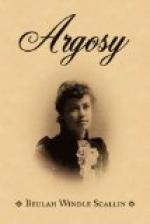Just before the death of Raymond Monk, the living of Church Leet became vacant, and the last act of his life was to present it to a worthy young clergyman named George West. This caused intense dissatisfaction to Godfrey. He had heard of the late incumbent’s death, and when he arrived home and found the living filled up he proclaimed his anger loudly, lavishing abuse upon poor dead Raymond for his precipitancy. He had wanted to bestow it upon a friend of his, a Colonial chaplain, and had promised it to him. It was a checkmate there was no help for now, for Mr. West could not be turned out again; but Captain Monk was not accustomed to be checkmated, and resented it accordingly. He took up, for no other reason, a most inveterate dislike to George West, and showed it practically.
In every step the Vicar took, at every turn and thought, he found himself opposed by Captain Monk. Had he a suggestion to make for the welfare of the parish, his patron ridiculed it; did he venture to propose some wise measure at a vestry meeting, the Captain put him and his measure down. Not civilly either, but with a stinging contempt, semi-covert though it was, that made its impression on the farmers around. The Reverend George West was a man of humility, given to much self-disparagement, so he bore all in silence and hoped for better times.
* * * * *
The time went on; three years of it; Captain Monk had fully settled down in his ancestral home, and the neighbours had learnt what a domineering, self-willed man he was. But he had his virtues. He was kind in a general way, generous where it pleased him to be, inordinately attached to his children, and hospitable to a fault.
On the last day of every year, as the years came round, Captain Monk, following his late father’s custom, gave a grand dinner to his tenants; and a very good custom it would have been, but that he and they got rather too jolly. The parson was always invited—and went; and sometimes a few of Captain Monk’s personal friends were added.
Christmas came round this year as usual, and the invitations to the dinner went out. One came to Squire Todhetley, a youngish man then, and one to my father, William Ludlow, who was younger than the Squire. It was a green Christmas; the weather so warm and genial that the hearty farmers, flocking to Leet Hall, declared they saw signs of buds sprouting in the hedges, whilst the large fire in the Captain’s dining-room was quite oppressive.
Looking from the window of the parsonage sitting-room in the twilight, while drawing on his gloves, preparatory to setting forth, stood Mr. West. His wife was bending over an easy-chair, in which their only child, little Alice, lay back, covered up. Her breathing was quick, her skin parched with fever. The wife looked sickly herself.
“Well, I suppose it is time to go,” observed Mr. West, slowly. “I shall be late if I don’t.”




